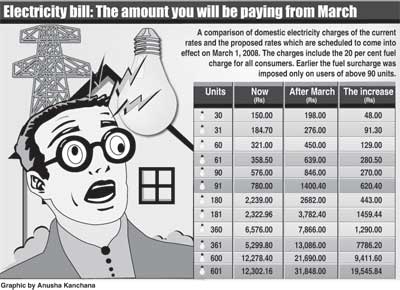
Be ready for your daylight to be knocked offElectricity consumers are set to receive one of the biggest shocks, with the proposed tariff rates due to come into effect on March 1 bringing about an increase of 40 percent on their bills. A Treasury decision to withdraw a subsidy with effect from this year has triggered off the increase, as the Ceylon Electricity Board (CEB) will now be forced to purchase fuel for thermal power production at market prices. The CEB which was invoiced Rs. 55 per litre for diesel last year when the world market and local prices were higher will now be invoiced at an average price of Rs. 85 a litre amidst indications that the fuel prices would further increase. The CEB which was selling electricity below the production cost will now be selling electricity without losses, but the entire burden will now be passed on to the consumers and also to some industrialists from whom concession will be withdrawn. One of the key features of the proposed increase would be that the low income groups will be hit by a 20 per cent fuel surcharge imposed on them, a scheme which was hitherto introduced only for users of more than 90 units in a bid not to bring additional burden on the low income groups. However, the bigger increase – an increase of 88 per cent will be introduced on those using more than 180 units. A consumer using 181 units and has hitherto been paying Rs. 2,322.96 will be paying Rs. 3,782.40 for the same number of units with the proposed scheme – an increase of Rs. 1,459.44.
The drastic increase between 180 and 181 units has been due to the removal of the block tariff system under which consumers were charged at different rates depending on the number of units they used with different charges for seven different blocks.Religious institutions including temples and churches have not been spared in the proposed increase as the fuel adjustment charge which was so far not imposed on these institutions will be imposed from March 1. Accordingly concessions enjoyed by these institutions since 1987 are being removed. CEB Chairman Udaya Kariyawasam told The Sunday Times the CEB had no alternative but to increase the tariffs as the government had decided not to subsidise fuel supplied for thermal power generation from January. He said, however, the decision to increase electricity rates had been taken by a Cabinet-appointed committee. The government during the past few years had subsidized the CEB with Rs. 5,000 million per year and in 2005 the subsidy was Rs. 11,000 million. Under the new scheme, the hotel industry will not receive the concessionary facilities but some other industries will continue to receive them. The effects of the increased electricity rates will flow down to the cost of living with all industrialists being forced to pay additional charges for electricity. Consumers have reacted angrily to the proposed increase in electricity rates and its impact on the overall cost of living. Senaka de Silva, Vice President of Hoteliers’ of South, said almost all the hoteliers around the country were facing huge difficulties at present and the removal of electricity concessions would have a negative impact on the hotel and tourism industry. “We can’t keep on increasing our charges in hotels frequently. Therefore this increase would be a heavy burden on hoteliers. If we have uninterrupted clientele, it wouldn’t have affected much but with the country’s present situation our industry is already facing serious problems,” he said. Housewife S. Gunewardena from Rajagiriya said the working class would be seriously affected by the increase in electricity rates. She said she feared that with the electricity hike, the prices of almost all other goods would go up. K. Senaratne from Nawala said they were even now restricting the use of electrical appliances because of the high charges. But from March, the situation would be much more difficult. The financial manager of a private hospital in Colombo said their cost would go up sharply because the hospitals were air-conditioned and a large amount of electricity was needed for medical equipment.He warned they would have no option but to pass on the additional costs to the patients. Many restaurants also expressed concern.
The accountant of Shanti Vihar in Havelock Road said they would have no option but to increase prices.
A Kollupitiya restaurant owner said the number of customers had already dropped due to security reasons and the increase in electricity rates would be a severe blow to the business. |
|
||||||
|| Front
Page | News | Editorial | Columns | Sports | Plus | Financial
Times | International | Mirror | TV
Times | Funday
Times || |
| |
Reproduction of articles permitted when used without any alterations to contents and the source. |
© Copyright
2008 | Wijeya
Newspapers Ltd.Colombo. Sri Lanka. All Rights Reserved. |
